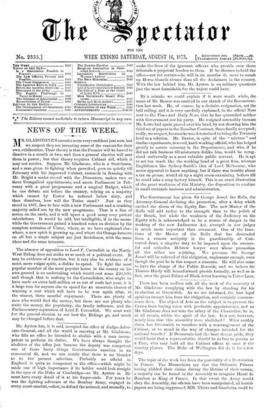By a mistake we could explain if it were worth
while, the name of Mr. Baxter was omitted in our sketch of the Reconstruc- tion last week. He, of course, by a decisive resignation, set the ball rolling, and it is very carefully explained, in the official Note sent to the Times and Daily News, that he has quarrelled neither with Government nor his party. He resigned ostensibly because Mr. Lowe had again passed over his head, by not showing him the third set of papers in the Zanzibar Contract, those finally accepted; really, we suspect, because he was determined to bring the Treasury feud to a solution. Mr. Baxter, in spite of the " mixture " and similar experiments, is a cool, hard-working official, who has helped greatly to secure economy in the Departments, and who, if he did not talk business till aristocrats dislike him, would be recog- nised universally as a most valuable public servant. He is apt to act too much like the working head of a great firm, whereas Englishmen like Sydney Smith's idea of Lord Melbourne, who never appeared to know anything, but if there was trouble about a tax on grease, would sit up a night cross-examining boilers till he could take a soap factory himself. This is an exact illustration of the great weakness of this Ministry, the disposition to confuse in small externals business and administration.






























